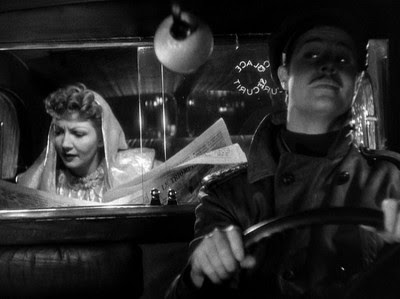Every Cinderella has her "Midnight".
1934 was a very important year in Hollywood. The Hays Office production code came into full effect, radically altering the tone and content of films produced. Prohibition had been officially repealed in December of 1933, allowing alcohol to be sold legally once again, and President Roosevelt's "New Deal" policies were starting to make themselves felt, putting the first dents in the horror of the Great Depression.
It Happened One Night had been released in cinemas, capturing the hearts and minds of the movie going public, while Fred Astaire and Ginger Rogers teamed up for The Gay Divorcee; the first time they received top billing together. (They had previously - and memorably - appeared together as the "comic relief" in Flying Down to Rio, released in December of 1933.)
All of these events were important, to be sure. But the most significant event for Hollywood that year was probably something that would have gone unnoticed by almost everyone at the time. It was in 1934 that a young, Jewish, Austro-Hungarian refugee (one of many) arrived, running away from the Nazis and hoping to find work as a writer. His name was Billy Wilder.
Billy Wilder was eventually going to become a film-maker whose films would define an era of American Cinema. But in the beginning he was just another out-of-work immigrant who was desperate not to be sent back to Nazi Germany.
It was only after spending several years as a writer that he eventually decided to try his hand at directing, mostly because he got tired of seeing other directors making unilateral changes to his scripts. The film we are showing this week is from this point in his career, when he was still writing screenplays for others.
I say "sort of" because Midnight was released in 1939, six months before the official outbreak of World War II. By this point, Europe (the real Europe; the one that Billy Wilder and his compatriots were running away from) didn't look anything like the Europe depicted in Midnight. This is not down to naïveté or bad writing, and certainly not down to ignorance on the part of anyone involved in the production. If anything, films like this one represented the culture that so many Hollywood émigrés had been forced to abandon when they fled for their lives. These films were their way of preserving a culture and an era that they were all too aware was almost certainly gone forever.
In this particular film, Claudette Colbert plays Eve Peabody, and American chorus girl who has arrived in Paris from Monte Carlo with literally nothing but the (Gold Lamé ) shirt on her back.
She strikes up an immediate friendship with Hungarian taxi driver Tibor Czerny (Don Ameche) as she spends the evening unsuccessfully trying to find a job. When she ducks into a private soirée to get out of the rain, she encounters serial womanizer and professional lounge lizard Jacques Picot (Francis Lederer) who had up to that moment been working his slimy charms on Madame Flammarion (Mary Astor) the wife of old-world aristocrat George Flammarion (John Barrymore).
You know what? Never mind the plot. Like most screwball comedies, Midnight is much too byzantine to explain in a few paragraphs, although everything makes sense when you're living through it. The true heart of the film is the chemistry between Claudette Colbert and Don Ameche, as well as the magnificent performance from John Barrymore.
Barrymore could be plausibly described as one of the first truly great cinema thespians. His Hamlet in 1925 was widely considered to be the standard by which all other Hamlets were measured, but he famously got bored playing the same part night after night, and found much more stimulation in movie acting. He also found much stimulation in lots of other things, and those things were rapidly catching up with him by 1939.
Although he is no longer the sex god of his early career, his performance in Midnight is still a wonder to behold, while Claudette Colbert and Don Ameche are clearly enjoying themselves immensely.
Czechoslovakia and Austria had fallen to Nazi Germany, Hungary had joined the Axis powers and the rest of Europe was watching to see what Hitler was about to do to Poland, but in the meantime, fim-makers like Billy Wilder and Mitchell Leisen were reminding audiences that Europe had once stood for other things as well.
And Cinderella could still go to the ball. At least until Midnight.
We will screen Midnight at 7.30pm on Thursday, the 22nd of February at the Victoria Park Baptist Church.
















Comments
Post a Comment